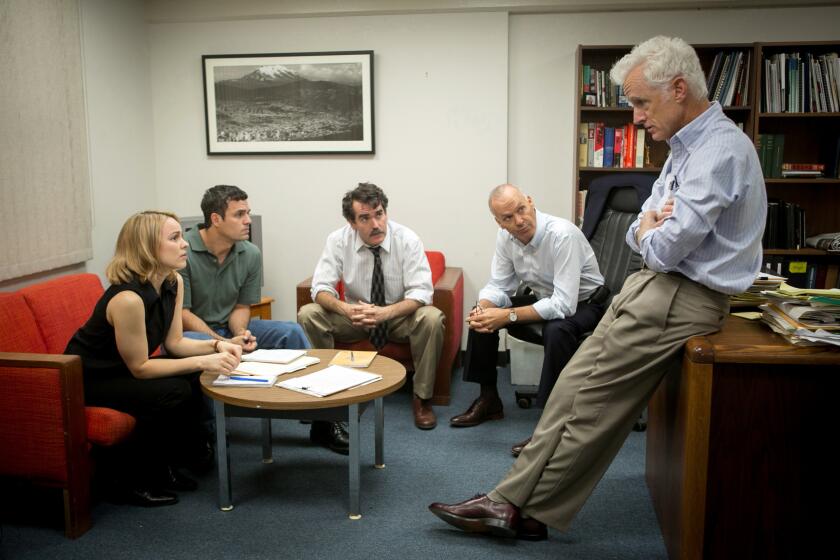The view from AJC
David A. Harris, executive director of the American Jewish Committee, visited the editorial board yesterday to discuss various issues in the Middle East. Harris has recently returned from a tour of several Arab countries. Some highlights:
Annapolis and the two-nation-state solution
Nick Goldberg: I’m just curious, would you, you know, having, having spent time in the six Arab countries in the run-up to Annapolis, do you, do you really get the sense that, uh, you know, this is gonna be a meaningful set of negotiations that we’re entering? I mean Hamas not at the table, they control half mm, a substantial portion of the Palestinian territory. Hezbollah’s not there, Iran wasn’t there, Arab countries went but we all know they went grudgingly; they’re not willing to concede this, already they weren’t able to, uh, you know, come up with much of a framework to begin these talks that goes beyond, you know, the problematic framework that has existed in the past. Do you really see anything coming out of this?
David A. Harris: If I, if I were, if I were a betting person, I, I couldn’t bet, I couldn’t bet on success, for all the reasons you mentioned, and also for the history of, of negotiations, and I could throw in a few other reasons why as well. Because I for one believe at the end of the day that, that the, the root cause of this conflict, more than any other, is not the ‘67, it’s not the ’67 borders, it’s not the settlements and believe me, I don’t minimize their importance to, to an outcome but I believe that the essence of this from the beginning has been the unwillingness and inability of the bulk of the Arab world to accept the legitimacy of, of a non-Arab, non-Muslim state in their midst, whatever its final borders.
And in particular, their inability to accept, um, Israel’s right to exist, its very right to exist, its legitimacy as a state, notwithstanding the partition plan which was endorsed today and was reflected most recently, I think, in several comments including by Saeb Erekat, the Palestinian negotiator, who, you know, when asked about the notion of a Jewish state, said, “We will not recognize Israel as a Jewish state.” That’s exactly what the UN endorsed 60 years ago today, and 60 years later, today, the principal Palestinian negotiator, who understands that he’s dealing with an Israeli team, um however hardnosed, as they should be, nonetheless has embraced the notion of two states, not two states, two nation states. That’s the operative terminology today. An Israel as a solution to the Jewish question, and a Palestine as a solution to the Palestinian question. This is as far as any Israelis have gone, I can’t imagine Israelis going farther, in fact I’m not sure that this current coalition will be able to sustain successful negotiations, assuming for a moment that they move forward, especially with two coalition partners who, who might leave, especially if, particularly if the subject of Jerusalem is broached.
Tim Cavanaugh: I’m sorry, but uh, I wanna understand the phrase that you just used. Two-dash-nation state?
David A. Harris: No. no. two-space-nation-space-states. Not just two states, two nation states. A Jewish state called Israel, and a Palestinian Arab state called Palestine. This is the language that Prime Minsiter Olmert has been using, that Foreign Minister Livni has been using, that President Bush has embraced, and by the way when President Sarkozy, when he spoke with us and he paused, and he said, “I support the principle of two nation states,” and then he, he looked at us and he said, “I wanna be clear you heard what I said.” You know, it’s not as if we didn’t hear him. I am emphasizing that this is not a question of semantics. These are words pregnant with meaning.
Nick Goldberg: I don’t understand the meaning. You’re making some distinction between states and nation states and I’m not sure I understand what
David A. Harris: Based on nationhood. On nationality. That, that there is, that Israel
Nick Goldberg: As opposed to
David A. Harris: As opposed to to, to what? I mean, what is the United States based on? A common belief in the founding documents. That Israel is a Jewish state, and that Palestine is the answer to the Palestinian question, including, principally, the refugee question.
Tim Cavanaugh: How does this differ from the position taken by Rabin or Barak?
David A. Harris: Not at all. Not at all. The, it, it doesn’t differ at all, it’s just become, it’s just found, it’s found its home in language. They were expressing the same thing, because they understood that as long as the Palestinians, um, insist on the so-called “right of return,” that this becomes the sword of Damocles leading to the destruction of Israel.
Tim Cavanaugh: But can I just ask, if we’re talking about two nation states based on nationality, does that mean ’67 refugees have a right of return...
David A. Harris: No because the ’67 refugees will largely find that where they live will be in the new Palestinian state.
Nick Goldberg: That means then, no Palestinians have a right of return into territorial
David A. Harris: That’s right.
Nick Goldberg: My question, what about the Palestinians, what about the Arabs who live within
David A. Harris: Nothing changes.
Nick Goldberg: What is it Nothing changes, but they continue to live in a Jewish state
David A. Harris: Right
Nick Goldberg: in which the, in which the people who run the country they’re concerned about the demography, the demographics
David A. Harris: Right.
Nick Goldberg: the growth rate, now they would have the world’s you know imprimatur, as they already do. You run this country despite the fact that you have this minority in your mix, what kind of democracy is that?
David A. Harris: I mean, look
Nick Goldberg: It’s the oldest question in the world
David A. Harris: Well they are but, you know, I mean, they’re questions that we wrestle with every day because we clearly say that Israel is both a democratic and Jewish state, and it rolls of the tongue very
Nick Goldberg: We all say that. The Arabs
David A. Harris: We at AJC um and it rolls of the long very glibly , but on closer examination it’s obvious to any of us that reconciling these two notions is not simple, and there’s no, there’s no, there’s no, there’s no playbook we can pull off the shelf to figure out how to achieve this. Um, on the other hand, uh, Israel was created by the UN as the solution to the Jewish problem, and as the realization, since it was not just the Jewish problem, as the realization of the Jewish dream. That these two elements, and Israel has for 60 years, as you know sometimes successfully, sometimes clumsily dealt with not just the minority and how to reconcile the majority-minority relation, by the way which are not unique to Israel. I mean, the minority-majority issues go on every day in Canada, in Belgium, in Cyprus, and lots of other countries in the world. And, by the way, not always successfully, as we look at the potential breakdown of Belgium as a country.
But the real question is also, that Israel’s minority population, is, is culturally identified, in some respects, with Israel’s neighbors, who have largely been hostile to Israel’s very existence. So how do you on the one hand, um, reconcile their tribal affiliation, if you will tribal, religious, linguistic affiliation with nations that traditionally have been your enemies on the one hand, and at the same time, seek to find a place for them in your home in your country, because of your commitment to both democracy and pluralism? I’m not suggesting there’s an easy answer, and I’m not suggesting Israel has found the perfect answer. But I’m saying, that I think it’s to Israel’s credit that it wrestles with these issues.
Recipe for peace: not guaranteed!
There are a set of unique circumstances today which I think explain why the parties gathered in Annapolis, and which might, just might, propel this process forward: one, an Israeli government of the center, not of the left, of the center, um, that while weak, nonetheless reflects the larger Israeli consensus of the day, that we have to achieve these, the compromise; two, an American administration which the Israelis trust, as much, if not more than, any American administration in history, and the uncertainty which is simply a big question mark, of who comes next and what their priorities will be; three, the recognition in the Arab world that the real threat to them is not Israel. It’s Iran. And that the real, if you will, dividing line, is not Israel and Arabs, it’s moderates and extremists. That there has to be a response to the Iranian Hezbollah, Hamas, and arguably Syrian, connection.
And that has to be forced by solving the Arab-Israeli issue and getting it out of the way in order to strengthen the response to Iran. And four, from the Israeli perspective, if you have a leadership team in the West Bank, which while not card-carrying Zionists, seems more disposed to a serious negotiation and compromise, than its predecessor. Remains to be seen. But this, this is the Israeli calculation. Nothing lasts forever and the Israeli belief, as I understand it, is that if you, if you forgo this moment, the trends in the Middle East are working against, not for, uh the forces of our side. So if you wait a year, or two, or three, there’s as a good chance that Hamas will be in the West Bank, that Hezbollah will be even more empowered in Lebanon, that Iran will be even closer to a nuclear weapon.
Iran and UN Security Council sanctions
The Iranian calculus seems to be, as best we can tell, until now, that they can count on the slow speed, um of the six major powers’ consensus process. Uh, and if you look at the pacing of the UN security council resolutions to date, um, including 1737 and 1747, which are the two resolutions, the second of the two was adopted in March; uh, right now, eight months later, there is not yet a third, though, if you go back to the text of the second, the third should have been triggered, several months ago. Um the Iranians are counting in particular on the Chinese and Russians serving as brakes on the process, and on other internal divisions amongst the six nations they can exploit. And so from our perspective there still remains quite an arsenal of diplomatic, economic and financial measures that can be taken ought to be taken on four levels:
The global level, which is the UN Security Council, in particular;
On the regional level, and in particular that’s the European Union, which constitutes 40% of Iran’s external trade;
On the national level, the U.S., since ’79 set a pretty strict uh enforcement of measures but other countries less so, so you look at other countries like Germany, Italy, Spain, Austria, France, which traditionally have had quite robust commercial relations which are beginning to ratchet them down, but there’s certainly more room for that;
And fourth, on a multinational corporate level, where a number of corporations including major banks .... and others, have for reasons primarily of reputational risk, pulled out of the Iranian market.
So on all four levels, there’s more room, of course, and then in particular in the United States you’ve had these, the state and city measures including here in California; you don’t have their equivalent elsewhere in other countries, but that adds perhaps a fifth dimension to if you will the arsenal, the toolkit, of things that are possible in order to send a message in the belief that within iran there are different centers of power and decision-making, that it is not a monolithic, unified decision-making apparatus. Iran is not North Korea, and the Iranian people are not the North Korean people. This, this is the premise.






